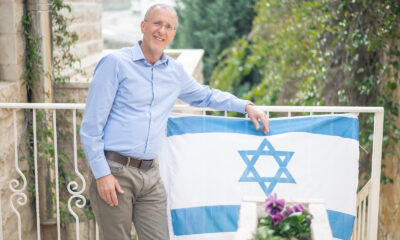
OpEds

Israel’s religion and state not so far apart
The doomsday scenario that Jewish communities worldwide are hearing and feeling about religion and state in Israel ignores one thing: the realities on the ground.
I won’t enter the fray of the debate over judicial reform in this OpEd. That’s for another time. But the quiet changes taking place in Israel are setting the stage for positive developments in finding the balance between a Jewish and democratic state.
Let’s start with education. Schools that teach general studies are opening throughout the haredi (ultra-Orthodox) community. Rabbi Menachem Bombach, a Vishnitzer chassid from Mea She’arim, founded the Netzach Education Network, which now has 16 branches throughout Israel. These schools teach students a full general studies curriculum that prepares them for bagruyot – Israel’s matriculation exams – as thousands of haredi boys and girls are being prepared for college and entering the workforce.
Yes, the current government is doing whatever it can to stop haredi schools from teaching general studies. But that train has left the station. Thanks to these schools, the many others not affiliated with this network, and the many new ones that will be opened by Netzach Education Network, Israel will be filled with haredi doctors, lawyers, accountants, and hi-tech entrepreneurs.
The number of adult haredi males entering the workforce has been quite low, but there are many efforts to change this. For example, Avodot Laharedim, an employment service run by haredim, has helped more than 100 000 men find jobs. That and other initiatives are helping to create homes in which parents support their families with dignity. Those parents will most likely send their children to schools that teach general studies to empower them to enter the workforce at an even higher level.
The haredi community, on the whole, doesn’t accept mandatory service in the Israel Defense Forces because of the religious challenges that soldiers face in the largely secular environment of the army. But over the past decades, numerous programmes have been established that draw haredim to serve in the military, including exclusively haredi units. I was privileged to be the Knesset member who helped obtain official government recognition for the first ever haredi Hesder Yeshiva, Beit Midrash Derech Chaim. It’s a five-year programme in which the young men study in a yeshiva in the morning and afternoon for three years, and are trained in various vocations at night. Then, for years four and five, they leave yeshiva in the morning to serve in the army in their area of expertise and return to the yeshiva to study at night. What began with a mere handful of students has now grown to hundreds.
Why is all this relevant to religion and state in Israel?
An overwhelming majority of Israelis believe that compromises need to be made by all sides to reach agreements about all the major religion and state issues in Israel. These include the most difficult ones, such as determining the laws of marriage and how public transportation and commerce on Shabbat should work. The challenge is the haredi political power, which blocks any progress on resolving these issues. Many believe that since the haredi community has more children than the rest of Israel, haredi political power will continue to grow, thereby preventing any compromise and resolution to the religion and state issues.
However, careful analysis of election results shows that haredi political power isn’t growing alongside population growth. United Torah Judaism remains at about seven seats each election. Shas is predominantly traditional and even secular Sephardim, with only a few of its mandates representing haredim who seek to maintain the status quo on religion-and-state issues. That’s happening because of the large numbers – especially among the younger members of the community – who are integrating into Israeli society.
To clarify, integration doesn’t mean that they cease to be haredi. Instead, it means that they learn to combine being Torah scholars and fervently religious with general studies and supporting their families in a dignified manner. Those haredim aren’t voting for haredi parties simply because they are told to do so. They choose the party and leaders they believe are best for Israel.
The proof took place five years ago in my home town of Bet Shemesh. A religious Zionist woman with a PhD, Dr Aliza Bloch, defeated a two-time incumbent haredi mayor in a city that has a haredi majority. Thousands of haredim either voted for Bloch or didn’t vote to enable her to win. These are primarily the haredim working, serving, or enrolling their children in schools with general studies.
I’m confident that due to all the above developments, Israel will, over time, have a political constellation that will allow for the compromises from both sides necessary to solve its religion and state challenges. That will hopefully be concretised in a Constitution as well. For now, we need diaspora Jewry to remain engaged with Israel and continue to raise its voice in favour of an embracing Jewish state that seeks solutions to these issues.
In spite of all the negativity and doomsday scenarios, good news is on the horizon.
- Dov Lipman served as a member of the 19th Knesset, and is the founder and chief executive of Yad L’Olim, a non-government organisation that assists, guides, and advocates for olim from around the world [www.yadlolim.org].











yitzchak
September 19, 2023 at 11:21 am
The realities on the ground are about creeping religious interference in secular choices. shabbat transport ,kashrut depending on opening hours .and observance.(where certificates are withdrawn for non shabbat observers,
in an attempt to close down such establishments completely)
If you want to live in a ghetto that’s YOUR choice
You evaded the draft issues at the secular expense.You evaded the attack on an Israeli Woman soldier who was abused in Bet Shemesh.
gimme a break!
The worst example of religious interference in civil matters was the Meiron Disaster underwritten by coalition agreements and collusion